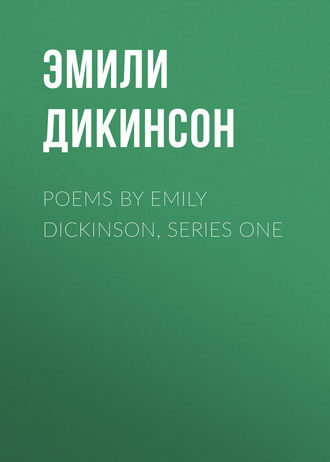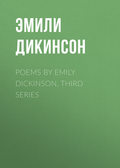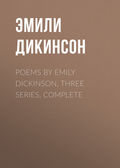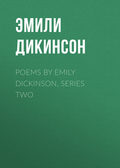полная версия

Эмили Дикинсон
Poems by Emily Dickinson, Series One
XXVIII
AUTUMN
The morns are meeker than they were,
The nuts are getting brown;
The berry's cheek is plumper,
The rose is out of town.
The maple wears a gayer scarf,
The field a scarlet gown.
Lest I should be old-fashioned,
I'll put a trinket on.
XXIX
BECLOUDED
The sky is low, the clouds are mean,
A travelling flake of snow
Across a barn or through a rut
Debates if it will go.
A narrow wind complains all day
How some one treated him;
Nature, like us, is sometimes caught
Without her diadem.
XXX
THE HEMLOCK
I think the hemlock likes to stand
Upon a marge of snow;
It suits his own austerity,
And satisfies an awe
That men must slake in wilderness,
Or in the desert cloy, —
An instinct for the hoar, the bald,
Lapland's necessity.
The hemlock's nature thrives on cold;
The gnash of northern winds
Is sweetest nutriment to him,
His best Norwegian wines.
To satin races he is nought;
But children on the Don
Beneath his tabernacles play,
And Dnieper wrestlers run.
XXXI
There's a certain slant of light,
On winter afternoons,
That oppresses, like the weight
Of cathedral tunes.
Heavenly hurt it gives us;
We can find no scar,
But internal difference
Where the meanings are.
None may teach it anything,
' T is the seal, despair, —
An imperial affliction
Sent us of the air.
When it comes, the landscape listens,
Shadows hold their breath;
When it goes, 't is like the distance
On the look of death.
IV.
TIME AND ETERNITY
I
One dignity delays for all,
One mitred afternoon.
None can avoid this purple,
None evade this crown.
Coach it insures, and footmen,
Chamber and state and throng;
Bells, also, in the village,
As we ride grand along.
What dignified attendants,
What service when we pause!
How loyally at parting
Their hundred hats they raise!
How pomp surpassing ermine,
When simple you and I
Present our meek escutcheon,
And claim the rank to die!
II
TOO LATE
Delayed till she had ceased to know,
Delayed till in its vest of snow
Her loving bosom lay.
An hour behind the fleeting breath,
Later by just an hour than death, —
Oh, lagging yesterday!
Could she have guessed that it would be;
Could but a crier of the glee
Have climbed the distant hill;
Had not the bliss so slow a pace, —
Who knows but this surrendered face
Were undefeated still?
Oh, if there may departing be
Any forgot by victory
In her imperial round,
Show them this meek apparelled thing,
That could not stop to be a king,
Doubtful if it be crowned!
III
ASTRA CASTRA
Departed to the judgment,
A mighty afternoon;
Great clouds like ushers leaning,
Creation looking on.
The flesh surrendered, cancelled,
The bodiless begun;
Two worlds, like audiences, disperse
And leave the soul alone.
IV
Safe in their alabaster chambers,
Untouched by morning and untouched by noon,
Sleep the meek members of the resurrection,
Rafter of satin, and roof of stone.
Light laughs the breeze in her castle of sunshine;
Babbles the bee in a stolid ear;
Pipe the sweet birds in ignorant cadence, —
Ah, what sagacity perished here!
Grand go the years in the crescent above them;
Worlds scoop their arcs, and firmaments row,
Diadems drop and Doges surrender,
Soundless as dots on a disk of snow.
V
On this long storm the rainbow rose,
On this late morn the sun;
The clouds, like listless elephants,
Horizons straggled down.
The birds rose smiling in their nests,
The gales indeed were done;
Alas! how heedless were the eyes
On whom the summer shone!
The quiet nonchalance of death
No daybreak can bestir;
The slow archangel's syllables
Must awaken her.
VI
FROM THE CHRYSALIS
My cocoon tightens, colors tease,
I'm feeling for the air;
A dim capacity for wings
Degrades the dress I wear.
A power of butterfly must be
The aptitude to fly,
Meadows of majesty concedes
And easy sweeps of sky.
So I must baffle at the hint
And cipher at the sign,
And make much blunder, if at last
I take the clew divine.
VII
SETTING SAIL
Exultation is the going
Of an inland soul to sea, —
Past the houses, past the headlands,
Into deep eternity!
Bred as we, among the mountains,
Can the sailor understand
The divine intoxication
Of the first league out from land?
VIII
Look back on time with kindly eyes,
He doubtless did his best;
How softly sinks his trembling sun
In human nature's west!
IX
A train went through a burial gate,
A bird broke forth and sang,
And trilled, and quivered, and shook his throat
Till all the churchyard rang;
And then adjusted his little notes,
And bowed and sang again.
Doubtless, he thought it meet of him
To say good-by to men.
X
I died for beauty, but was scarce
Adjusted in the tomb,
When one who died for truth was lain
In an adjoining room.
He questioned softly why I failed?
"For beauty," I replied.
"And I for truth, – the two are one;
We brethren are," he said.
And so, as kinsmen met a night,
We talked between the rooms,
Until the moss had reached our lips,
And covered up our names.
XI
"TROUBLED ABOUT MANY THINGS."
How many times these low feet staggered,
Only the soldered mouth can tell;
Try! can you stir the awful rivet?
Try! can you lift the hasps of steel?
Stroke the cool forehead, hot so often,
Lift, if you can, the listless hair;
Handle the adamantine fingers
Never a thimble more shall wear.
Buzz the dull flies on the chamber window;
Brave shines the sun through the freckled pane;
Fearless the cobweb swings from the ceiling —
Indolent housewife, in daisies lain!
XII
REAL
I like a look of agony,
Because I know it 's true;
Men do not sham convulsion,
Nor simulate a throe.
The eyes glaze once, and that is death.
Impossible to feign
The beads upon the forehead
By homely anguish strung.
XIII
THE FUNERAL
That short, potential stir
That each can make but once,
That bustle so illustrious
'T is almost consequence,
Is the eclat of death.
Oh, thou unknown renown
That not a beggar would accept,
Had he the power to spurn!
XIV
I went to thank her,
But she slept;
Her bed a funnelled stone,
With nosegays at the head and foot,
That travellers had thrown,
Who went to thank her;
But she slept.
'T was short to cross the sea
To look upon her like, alive,
But turning back 't was slow.
XV
I've seen a dying eye
Run round and round a room
In search of something, as it seemed,
Then cloudier become;
And then, obscure with fog,
And then be soldered down,
Without disclosing what it be,
'T were blessed to have seen.
XVI
REFUGE
The clouds their backs together laid,
The north begun to push,
The forests galloped till they fell,
The lightning skipped like mice;
The thunder crumbled like a stuff —
How good to be safe in tombs,
Where nature's temper cannot reach,
Nor vengeance ever comes!





